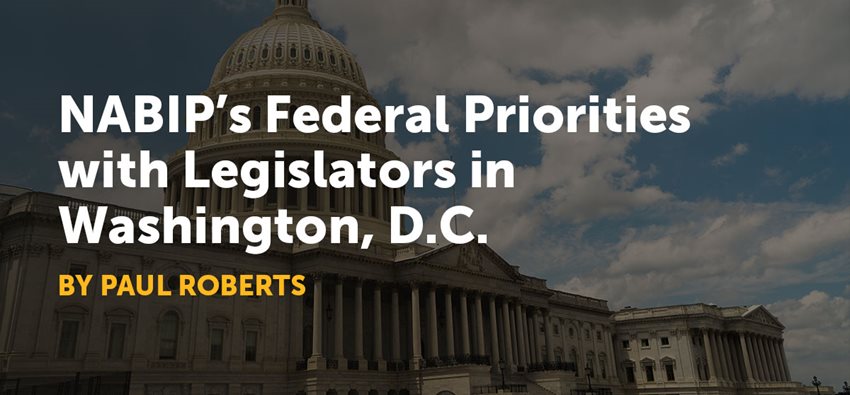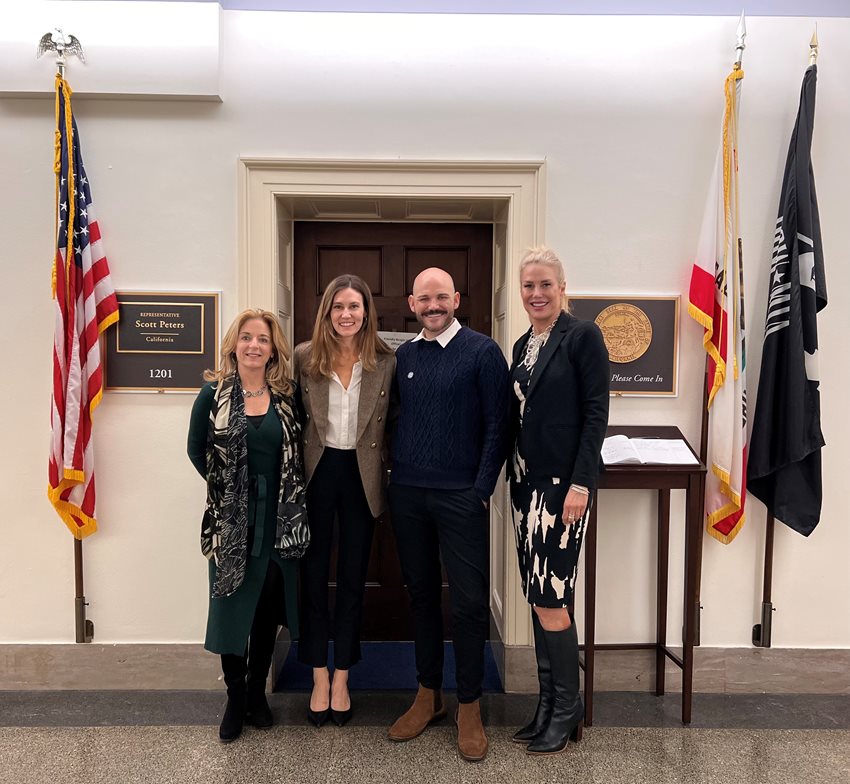NABIP’s Federal Priorities with Legislators in Washington, D.C.

Each year the National Association of Benefits and Insurance Professionals (NABIP, formerly known as NAHU) meets in Washington D.C. for its Capitol Conference.
NABIP, which represents more than 100,000 health insurance professionals, encourages its members across the country to participate in the four-day event, which focuses on education, legislative direction, and engagement on all-things-health care with federal legislators.
Word & Brown proudly presented a highly attended educational session at the event on February 27, 2023. The sold-out session covered trending compliance items in 2023, as NABIP members prepared for visits with legislators and learned about industry changes ahead of the end to the COVID-19 U.S. National Emergency and the HHS Public Health Emergency (both scheduled for May 11, 2023).
The NABIP Cap Con (as the event is known) calls for members from across the nation to descend on Capitol Hill to meet with federal legislators, discussing ways to improve the health care experience, and to seek support for the federal priorities of the industry and NABIP.
The unified message is welcomed and heard loudly throughout D.C. Several decades (nearly a century!) of annual NABIP discussions have shaped the industry for the better – generating strong consumer protections and better operation of the benefits and insurance industries. NABIP’s mission is to shape the future of health care, and Word & Brown is proud to partner with the association in these endeavors.
The 118th Congress has been in session since January 2023; it runs until January 2025 and covers the final two years of President Bident’s current term. Because the session just began, NABIP did not discuss any particular federal bills by name or by number. Instead, members and industry professionals spawned general discussions about the current direction of the industry, its problems, and the ways it can be improved by federal support and forthcoming legislation.
Following are a sample of NABIP’s federal priorities, which were shared in Washington D.C., including by members of The Word & Brown Companies, with legislators on Capitol Hill.
Addressing the Cost of Care
NABIP encourages Congress to create and support legislation to ensure that the cost of a health care service does not vary based on the location where the care is delivered. Currently, the cost of the same X-Ray, MRI, physician’s visit, etc., can differ drastically depending on where it is delivered (e.g., free-standing facility vs. hospital or outpatient hospital setting). NABIP supports site-neutral rules to deter location-based gaming of coverage to better balance the industry and to combat troublesome consumer “surprise billing.”
Preserving and Strengthening Employer-Sponsored Health Coverage
NABIP has held a fervent, longstanding position opposed to modifying, or placing a cap upon, the IRS individual tax exclusion for job-based coverage.
Current federal tax provisions allow employees to deduct the funds their employers spend on their health benefits (e.g., the employer’s benefit contributions) from their incomes. Current law also allows employees to fund personal contributions for the cost of coverage (employee contributions) with pre-tax dollars, under an employer’s Premium Only Plan (POP). Current law also allows employers to deduct the cost of health coverage as a business expense.
Recent 2023 reports from the Congressional Budget Office (CBO) state that eliminating or modifying these current rules could garner about $600 billion in additional federal revenue – an option that is attractive to federal legislators on each side of the aisle, as they work to hit budget targets.
Moves to place a cap upon, or eliminate, the employer tax exclusion would create significant barriers for employers when offering benefits. Without tax incentives for employers to provide benefits, and with employees paying significant taxes on their health benefits, the cost of employee benefits would become overwhelming. Employers may no longer be able to provide benefits to attract and retain employees, and employees may be less likely to participate in their job-based health plans with such tax changes. Since about 188 million Americans are currently covered by a group health plan, many would lose access to affordable coverage – without any affordability guarantees in other markets (e.g., Individual market, etc.).
Also expanding upon the employer market, NABIP supports the Commonsense Reporting Act. This would give Applicable Large Employers (ALEs, those subject to the ACA’s employer mandate) the option of reporting their offers of job-based coverage to the IRS prospectively, before annual Fall individual-plan Open Enrollment – rather than after the conclusion of a calendar year, which is the only current option. The current reporting timeframe has ALEs reporting 14 months after that Fall individual-plan Open Enrollment period and after an entire year of offering coverage. Reporting prospectively would equip consumers and state Exchanges with information to determine if an individual applicant is eligible for subsidized Individual coverage, rather than evaluating eligibility after the conclusion of the year in which the subsidized coverage was obtained. This would reduce the likelihood that an individual will have to pay back a Premium Tax Credit that was incorrectly assigned and would protect employers from having to incur additional accounting and legal costs to appeal potential ACA non-compliance penalties.
Another priority for NABIP is supporting initiatives to innovate Health Savings Account (HSA)-eligible High-Deductible Health Plans (HDHPs). While HSAs were created 20 years ago, laws that accompany them have not evolved. NABIP supports modifying HDHPs to allow plan holders to obtain primary care visits before the application of the plan’s deductible, which is currently prohibited.
NABIP opposes cost-shifting alternatives to treatment for End Stage Renal Disease (ESRD), the final permanent stage of chronic kidney disease, onto employer-sponsored plans. Current Medicare Secondary Payer (MSP) law requires the federal Medicare program to cover ESRD, for those entitled to Medicare based on ESRD diagnosis, for a 30-month coordination period. Proposals to limit this timeframe and shift costs onto employer-sponsored plans would be significant in cost and would create an unnecessary coverage mandate for the care of a specific disease. If enacted under current proposals as written, it could lead to other mandates for employers to cover other certain diseases, beyond what is already required for Qualified Health Plans (QHPs), further driving up the cost of care.
NABIP opposes civil monetary penalties from being imposed on employers for provider-network inadequacies. Current law generally penalizes employers if their networks of mental health providers are not equal in size to their networks of medical/surgical providers. Current efforts to penalize employers for non-compliance with network adequacy for mental health parity aim to penalize an entity (the employer) with no control over the network. Employers use networks formed by carriers or third-party administrators (TPAs) and do not have control over the contracted network. Instead, NABIP encourages Congress to focus on ways to encourage mental health providers to enter into networks, which would truly support network adequacy concerns.
Improving Medicare
Recent current law requires licensed Medicare insurance agents to begin their Medicare client-facing phone conversations with a disclaimer, record those phone calls, and store recordings for 10 years. NABIP supports legislation to explicitly exclude agents from the current requirement to record calls with beneficiaries, in addition to future regulation that relates to recording calls with beneficiaries. NABIP recognizes the increase in unscrupulous actors in the Medicare market and the need to combat them; however, NABIP believes these recent CMS regulations do not adequately address these entities. Instead, they inappropriately target licensed agents who are committed to acting in the best interests of Medicare beneficiaries. Note: This requirement only applies to agents transacting Medicare benefits with consumers, but not group or individual health plans.
NABIP also strongly supports allowing COBRA to be treated as “creditable coverage” for Medicare. Current law penalizes seniors with financial penalties if they continue an employer’s plan through COBRA in lieu of Medicare, beyond their Medicare eligibility date. However, current law does not punish those same seniors when they remain covered by that employer’s plan, based on current employment (i.e., not COBRA) beyond their initial Medicare eligibility date. Such coverage is considered “creditable coverage.” Switching from a COBRA plan to a Medicare plan can be disruptive to care and may come with financial consequences for terminating COBRA early to meet Medicare enrollment windows. NABIP supports allowing seniors to remain on their COBRA coverage without penalty, just as seniors who remain on similar employer-sponsored coverage without penalty. Additionally, NABIP urges Congress to support forthcoming legislation that would allow seniors enrolled in COBRA coverage to transition to Medicare Part B without a penalty, just like with non-COBRA group coverage.
Lastly, NABIP supports a new Medicare Part D open-enrolment period. Current law allows Medicare Advantage beneficiaries to change their plans during a three-month open-enrollment period (OEP) at the beginning of each calendar year. This gives Medicare Advantage subscribers the ability to change their plans once their plan year begins, if they discover they are not covered by the right plan that meets their needs. However, unlike Medicare Advantage, this option is not available for prescription drug plans in Medicare Part D. NABIP encourages Congress to enact similar consumer protections during the OEP for Medicare Part D plans, allowing beneficiaries to change plans, accessing the plans that best fit their prescription drug needs – rather than staying committed to the drug plan originally selected during the Annual Enrollment Period (AEP).
Note: While this column summarizes NABIP’s priorities for the 118th Congress, it is not exhaustive. NABIP supports other initiatives in addition to the items mentioned in this column.

Pictured: Word & Brown’s Senior Director of Education and Market Development, Paul Roberts, meeting with staff from U.S. Representative Scott Peters’ office, along with NABIP members Lauren Altman and Cheryl Cote from San Diego, CA.
Most Recent Articles
Carrier Updates
Carrier Updates

